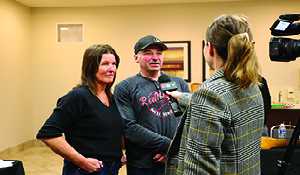Sask. looks at buying into pipeline projects
February 11, 2020, 10:29 am
Rob Paul, LJI Reporter


Saskatchewan’s provincial government has set up a committee to look at advancing pipeline projects, and is looking at buying into the projects if that’s what it takes to get them built.
Premier Scott Moe announced the establishment of the Pipeline Projects Assessment Committee (PPAC), a cabinet committee focused on evaluating potential pipeline projects in Saskatchewan last week.
PPAC is a cabinet committee formed to review and assess the viability of pipeline projects in Saskatchewan and possible government involvement in investing, stimulating, or generally advancing these projects.
“Our government recognizes the necessity of further developing pipeline infrastructure to help our energy products reach key global markets,” said Premier Moe.
“I am pleased to announce this cabinet committee to assess the viability of pipeline project proposals in Saskatchewan and the opportunity for our government to invest or support future pipeline projects.”
The decision to establish the PPAC stems from a number of proposals from businesses, indigenous groups, and communities that are looking at pipeline projects to advance access for Saskatchewan’s energy products to market.
This includes projects expanding access south through the United States, and projects that would create access through the port of Churchill.
The PPAC will be comprised of the following cabinet ministers:
• Minister of Finance Donna Harpauer
• Minister of Trade and Export Development Jeremy Harrison
• Minister of Energy and Resources Bronwyn Eyre
• Minister of Environment Dustin Duncan
Encouraging pipeline expansion and development within the province to enable the shipment of Saskatchewan oil through the U.S. and encouraging Indigenous equity participation in Saskatchewan pipeline projects were both goals set in Saskatchewan’s Growth Plan 2020-2030.
“We have decided to go forward with a pipeline review committee. It’s something that we feel is going to allow us to look at assess and engage with proponents of pipeline projects in a systematic and structured way,” said Minister of Trade and Export Development Jeremy Harrison.
The PPAC is coming together to help advance pipeline projects and give them more backing.
“We’re always talking with pipeline proponents, with energy companies. We do that all the time, everyday,” said Harrison.
“But this is going to allow us to engage in a more structured fashion. This is a way that we can consider those projects in a very thoughtful and systematic fashion.”
Harrison spoke of the importance of pipeline advocacy but said the projects need more than just moral and political support.
Government looking at buying in to pipeline projects
“We have been strong advocates for pipeline, energy infrastructure, energy projects in the past. Also, now we are going to be looking beyond advocacy. To different arrangements, to equity positions in these sort of projects, which is a new approach,” said Harrison.
“One thing we’ve heard over and over again is the challenge of securing financing in the open market because of political risk. We’re prepared to move from advocacy to looking at other options in how we can advance these pipeline projects going forward. The reason for that is the incredible importance of these pipelines to our economy.”
Although having government step into the pipeline situation isn’t their first choice, Harrison and the PPAC don’t see another option.
“It’s not ideal that you would have to have government involved in this fashion, in energy infrastructure projects. But the reality is unless governments are involved in energy infrastructure projects they aren’t going to get built,” said Harrison.
“We do have an economic and policy interest in having these pipelines constructed and that requires government to have a role beyond advocacy.”
When asked about specific pipelines, Harrison mentioned they are willing to look at all options that will work.
“We are prepared to engage in the conversation with proponents on projects whether they be North, East, West or South,” said Harrison.
The PPAC has already spoken with the federal government and are optimistic about the future of pipelines.
“We had a very good discussion with federal government,” said Harrison. “We had a very good discussion about a very long list of topics, pipelines being one of them.”
“They assured us they are committed to the Trans Mountain project going ahead as expeditiously as possible. That they have an understanding of moving energy by pipeline versus energy by rail.”
The PPAC wasn’t something that came together out of nowhere, many factors pushed its creation forward.
“There were a lot of catalysts for this. There is an increasing reality that unless government is directly involved beyond being supportive and advocates because of the political risk these projects aren’t going to get built,” said Harrison.
When asked about how this is different than the past, Harrison mentioned the direct involvement of the government up to and including taking an equity stake.
“We’re looking at ways the government can be involved to move these projects forward,” said Harrison. “That’s something that’s significant, new, and different.”
For now, there’s no information on how the PPAC will affect the provincial budget.
“The budget will be coming out in March. This is a priority for the province,” said Harrison.
The PPAC wants to have indigenous people directly involved in all projects going forward.
“I envision in the future having indigenous ownership and equity positions in energy infrastructure projects as a significant component,” said Harrison.
“I think you will find a lot of indigenous leaders who want to see these projects go ahead and want to be a part of these projects.”
“That’s a priority of this committee as well.
“Making sure we are maintaining those relationships and having those discussions with indigenous groups who wants to be a part of making these projects a reality.”
















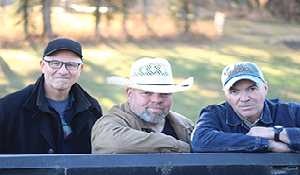

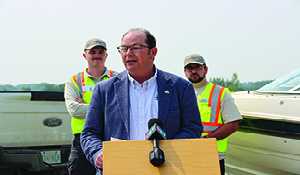


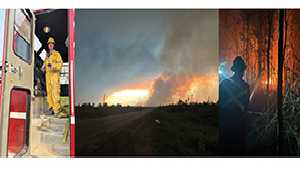









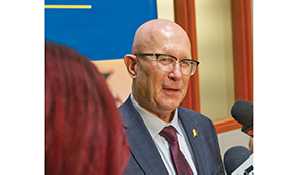
SM.jpg)

